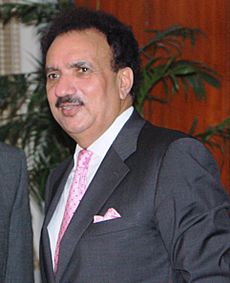Rehman Malik facts for kids
Quick facts for kids
Abdul Rahman Malik
NI
|
|
|---|---|

Malik in 2010
|
|
| 33rd Minister of Interior | |
| In office 25 March 2008 – 16 March 2013 |
|
| President | Asif Zardari Pervez Musharraf |
| Prime Minister | Yousaf Gillani Pervez Ashraf |
| Preceded by | Hamid Nawaz-Khan |
| Succeeded by | Malik Habib |
| Additional Director General of the Federal Investigation Agency | |
| In office 23 October 1993 – 10 November 1998 |
|
| Preceded by | G. Moinuddin |
| Succeeded by | Iftikhar Ahmad Khan |
| Pakistani Senator from Sindh | |
| In office March 2009 – July 2012 |
|
| In office March 2015 – March 2021 |
|
| Personal details | |
| Born |
Abdul Rehman Malik
12 December 1951 Sialkot, Punjab, Pakistan |
| Died | 23 February 2022 (aged 70) Islamabad, Pakistan |
| Citizenship | Pakistan (1951–2003; continued from 2013) United Kingdom (2003–2012) |
| Political party | Pakistan Peoples Party |
| Alma mater | University of Karachi |
| Notable award(s) | Nishan-e-Imtiaz (2012) |
Abdul Rehman Malik was a well-known Pakistani politician and a former officer of the Federal Investigation Agency (FIA). He served as the Interior Minister for Pakistan from 2008 to 2013. Before entering politics, he had a successful career in law enforcement.
Malik was born on December 12, 1951, in Sialkot, Punjab, Pakistan. He passed away on February 23, 2022.
Contents
Early Life and Education
Abdul Rehman Malik was born in Sialkot, Pakistan. He studied at the University of Karachi. In 1973, he earned his Bachelor of Science (BSc) and Master of Science (MSc) degrees in Statistics.
Later, in 2011, the Karachi University gave him an honorary PhD degree. This was to recognize his efforts in helping the country fight against terrorism. It also honored his work in bringing peace back to the city of Karachi.
Working in Government Agencies
In 1973, Malik started his career as an immigration agent. He worked for the National Alien Registration Authority (NARA). He then joined various parts of Pakistan's intelligence community. He helped investigate many criminal cases.
In the 1980s, he joined the Federal Investigation Agency (FIA). He became a special agent. He worked on cases against terrorist activities in the country. In 1993, he was promoted to Additional Director General of the FIA. The Prime Minister at the time, Benazir Bhutto, approved his appointment.
As a leader in the FIA, Malik worked to stop extremist groups in Pakistan. He also helped with the arrest and transfer of Ramzi Yousef to the United States in 1995. This was for a trial related to the 1993 World Trade Center bombing.
Life in the United Kingdom
In 1996, the government changed in Pakistan. Malik was arrested and held for about a year. After his release, he was removed from his position at the FIA in 1997.
Malik then moved to London, United Kingdom. He started his own private security company called DM Digital Network. He helped Benazir Bhutto, who was also living outside Pakistan at the time. He became her chief of security when she returned to Pakistan in 2007.
During his time in England, Malik became a British citizen. However, he stated that he gave up his British citizenship in 2020 before he took on public office in Pakistan.
Becoming a Political Leader
While in the United Kingdom, Abdul Rehman Malik became very involved with the Pakistan Peoples Party (PPP). He grew close to the party's main committee. In 2007, he became a trusted political helper for Benazir Bhutto. He was also made her chief of security.
He became well-known when he helped arrange a political agreement. This agreement allowed Benazir Bhutto to return to Pakistan. He played a key role in the PPP.
Serving as Interior Minister
After the 2008 elections, the PPP formed the government. Prime Minister Yousaf Gillani appointed Malik as an "adviser on interior, intelligence, and narcotics control." Later, on April 27, 2009, he became the full Interior Minister.
During his time as Interior Minister, Pakistan faced many security challenges. He worked to address issues like violence in different parts of the country. He also offered a reward for information leading to the capture of a Taliban spokesman. This spokesman had tried to justify the attack on Malala Yousafzai. Malala was a young girl who spoke up for girls' education.
There were some rules about government officials holding dual citizenship. The Supreme Court of Pakistan looked into Malik's citizenship. He stated that he had given up his British citizenship in 2008. In July 2012, he resigned from the Senate. This meant he also lost his position as Interior Minister. However, he continued to work with the Ministry of Interior at the request of the Prime Minister.
Later Life and Passing
Abdul Rehman Malik wrote four books. His first book, "Modi’s War Doctrine: Indian anti-Pakistan Syndrome," discussed India's policies towards Pakistan. This book received attention from Indian media.
Malik became ill with COVID-19. He was admitted to the hospital in February 2022. He passed away on February 23, 2022, at the age of 70.

